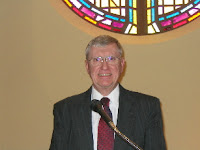“The biblical motive for
being a forgiving person may be deeper than being forgiven. It is true to say:
The motive for being a forgiving person is that we have been forgiven by God
when we did not deserve it (Ephesians 4:32). The bottom of this motive is not
God’s forgiveness, but what God’s forgiveness gives. It gives us God. … God is
the goal of forgiveness. He is also the ground and means of forgiveness. It
comes from him; it was accomplished through his Son; and it leads people
back to him with their sins cast into
the deepest sea. Therefore the motive for being a forgiving person is the joy
of being freely and joyfully at home with God.” – Don’t Waste Your Life, John Piper
Sunday, October 2, 2016
Sunday, September 11, 2016
For The Lord's Day
“True faith – created in me
by the Holy Spirit through the gospel – is not only a knowledge and conviction
that everything that God reveals in his word is true, but also a deep-rooted
assurance that not only others, but I too, have had my sins forgiven, have been
made forever right with God, and have been granted salvation. These are gifts
of sheer grace earned for us by Christ.” Zacharius Ursinus, 1534 – 1583
Ursinus is the author of the
Heidelberg Catechism and a part of the German Reformation. The Catechism along
with the Belgic Confession and the Canons of Dordt are known as the Three Forms
of Unity – the confessional statements of many of the continental Reformed
Churches, and some churches in our own country as well.
Sunday, September 4, 2016
For the Lord's Day
“Our need of Christ does not
cease with our believing; nor does the nature of our relation to Him or to God
through Him ever alter, not matter what our attainments in Christian graces or
our achievements in Christian behavior may be. It is always in His “blood and
righteousness” alone that we can rest. There is never anything that we are or
have or do that can take His place, or that can take place along with him. We
are always unworthy, and all that we have or do of good is always of pure
grace.” - - B. B. Warfield, Works,
vol. 7, p. 113
Sunday, August 21, 2016
For The Lord's Day
What can separate my soul
From the God who made me whole,
Wrote my name in heaven’s scroll?
Nothing, Hallelujah!
Trouble, hardship, danger, sword
Brought by those who hate my Lord?
Slander here? Or no reward?
Nothing, Hallelujah!
-- James Montgomery Boice
Sunday, August 14, 2016
For The Lord's Day
"The rulers of the earth
plan, and scheme, and make laws, and change laws, and war, and pull down one,
and raise up another. But they little think that they rule only by the will of
Jesus, and that nothing happens without the permission of the Lamb of God."
- J.C. Ryle from TableTalk
Sunday, August 7, 2016
For The Lord's Day
"God’s great end, in all
his works, is the glory of his own name; and especially his work of saving
sinners through Christ; and that which makes it a great work, is, because his
great name is so much concerned therein, and magnified thereby, that it is not
so greatly glorified any other way, as it is here." - Ralph Erskine
Ralph Erskine was one of the
“Marrow Men” of the Church of Scotland. The “Marrow Controversy” (1717-1722)
dealt with the heart of evangelical Reformed theology – God’s free, sovereign
grace. Erskine believed that legalism
– Christianity reduced to a set of rules, as well as antinomianism – we have liberty in Christ, are free from the law
and can live as we like; both are
errors that pull us away from a biblical understanding of the doctrines of
grace. I stand with the “Marrow Men.”
Subscribe to:
Comments (Atom)


